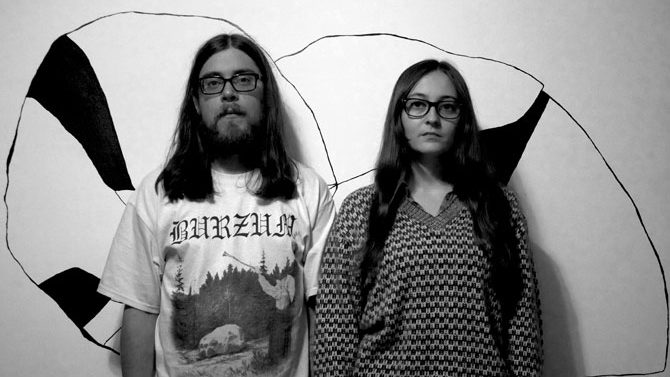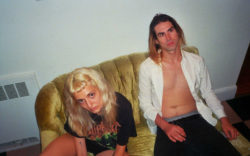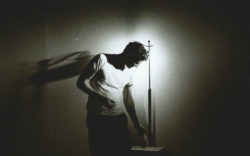In a garden, surrounded by the sweet, somewhat melancholic late-summer sound of chirping cicadas, the scene is perfect for a conversation with Grant and Rachel Evans, who, together, make up local post-ambient duo Quiet Evenings.
“We love being out in nature,” says Grant, who stresses that “there’s nothing sarcastic or ironic about” the unabashedly idyllic band name. “We wanted quiet evenings.”
Recently relocated to rural Winterville from LaGrange, GA (“We’d both just finished college, and we didn’t have any other reason to stay where we were at,” Rachel says), the couple, married since 2008, specializes in music that is experimental but not difficult, brainy but approachable. It unravels quietly, patiently, bursting with texture and atmosphere.
In person, the Evanses are both unassuming and soft-spoken—earnest, pleasant people whose mild demeanors bely their collective work ethic. Aside from Quiet Evenings, Rachel records and performs as Motion Sickness of Time Travel, while Grant pulls double solo duty under his birth name and, more recently, as Crippling.
Each moniker is its own entity, they say. “We started out doing solo music in the first place,” says Rachel. “Originally, Quiet Evenings was just kind of a melding of the two sounds,” Grant adds. “We weren’t working on any other projects. And then I guess I got the bug and started making different recordings, and they didn’t really fit in with what I was doing under my other solo name.”
Their art stems from a desire for exploration. “Sound, as an artform, is something [we’re] interested in,” says Grant. “The physicality of sound. And when you’re not being forced into the confines of 4/4 structure, or pop hooks and choruses, the mind is able to wander a bit more.”
Grant’s tape loop-driven music, characterized by dense, mazelike themes, is alternately absorptive and off-putting, too sprightly to be deemed “noise” but heavy enough to demand full attention. Rachel’s work boasts a synth-centric lightness of being, even featuring clipped vocals and glassy new wave textures at times (as on MSoTT’s forthcoming Perennials EP).
Together, their two styles melt endlessly into one another; a single Quiet Evenings song can be airy, beautiful, dark and dangerous. This unpredictability comes honestly. While with their solo work the Evanses rely on composition, at least to some degree, “Quiet Evenings is a lot of live jamming,” says Grant. “[I]t’s all really spur-of-the-moment.”
In addition to countless hours of their own material, the Evanses have released a small mountain of outside content via their boutique record label, Hooker Vision. Primarily, the label deals in limited-run cassette and vinyl formats, with split releases, foreign-based sounds and experimental pet projects the name of the game.
The duo makes no bones about Hooker Vision’s status as a niche project. (“It keeps itself alive, and that’s about it,” says Grant of the label’s financial status.) Still, due to recent attention from influential outlets like Pitchfork, Hooker Vision has seen a rise in stature—at least on the underground tape-trading scene. “It’s a collector’s community,” says Grant. “Everybody’s ready to get the next ultra-limited special-edition box set.”
In a stiflingly insular world where art itself is often undervalued, Hooker Vision’s goal is to put the focus back on quality of content.
“We’re not such fetishists that we’re gonna put out this American Tapes-style package that’s just the most incredible thing you’ve ever seen, but it’s kinda forgettable if you listen to it a couple times,” Grant says, referring to the defunct noise-cassette label. “I think there needs to be substance.”
Indeed, the Evanses’ ridiculously expansive personal catalog (a fresh batch of just-recorded material seems to appear nearly each month) has no shortage of substance. Take this year’s output alone: From Quiet Evenings’ serene, hourlong Patience Folding Waters to MSoTT’s phenomenal, self-titled double-LP to Grant’s gorgeous, unsettling Lines That Unfold, their music contains endless layers of mystery. The constant throughout is the unending inspiration the music takes from Earth itself.
“I’ve always felt that synthesizer and electronic sounds are just another version of the way nature sounds,” Rachel says. “I feel like they’re very connected, in a slightly different way. They both can sound very natural and organic.”
OK: Call ’em hippies if you like (they have been known to rock a tie-dyed tee or two), but the Evanses may well be onto something with this nature business.
“The last place we lived was on a lake, and very wooded,” says Rachel, “and now we’ve got more fields around us. I think our sound is gonna shift a little bit because of that. There’s more openness.”
Theirs is a sound that is always shifting, even within the confines of one album. In this way, the music truthfully reflects the physical space around it—a living, breathing reflection of the place we all call home.
Like what you just read? Support Flagpole by making a donation today. Every dollar you give helps fund our ongoing mission to provide Athens with quality, independent journalism.










